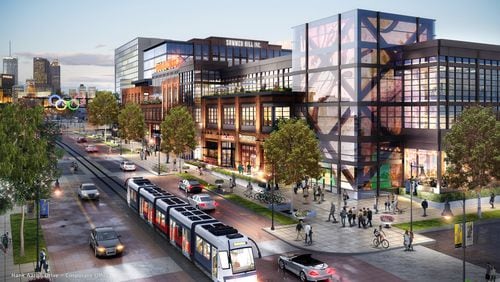The redevelopment of the Turner Field area will be about more than adding new apartments, opening trendy coffee shops or giving Georgia State University’s football team a permanent place to call home.
A deal struck Monday by GSU and Atlanta developer Carter & Associates — who bought the 68-acre site last year for $30 million — will address systemic flooding, provide jobs and education programs, and set aside at least 10 percent of new housing for low-income Atlantans, according to an agreement with community representatives.
The school and Carter said they signed a long-term plan for the university’s engagement with area residents with representatives of the Organized Neighbors of Summerhill, Peoplestown Neighborhood Association, Mechanicsville Civic Association and Grant Park Neighborhood Association.
“Georgia State believes the redevelopment of the Turner Field site will be transformational for all parties involved,” Georgia State President Mark Becker said in a statement.
Less than two weeks after the Atlanta Braves opened in their new Cobb County digs, the area’s new landlords are trying to alleviate residents fears that gentrification will force longtime homeowners and apartment dwellers out of their neighborhoods.
Georgia State and Carter — which bought the property along with partners Oakwood Development and Healey Weatherholtz Properties — are planning a $300 million mixed-used development that would bring new retail options, hundreds of new apartments for residents and students and a new baseball stadium for the school
In addition, Turner Field, which the Atlanta Braves vacated last year after 20 years, will be transformed into a football stadium for the GSU Panthers.
The agreement, whose final details were hashed out Monday in the office of Atlanta City Councilwoman Carla Smith who represents the area, comes as GSU students and residents have advocated for months the need for an agreement between the school and the community to take measures that would avoid displacement of longtime neighbors.
They also want more commitment that the area will develop with the entire community in mind, not just Georgia State students.
Protesters have shown up at Atlanta City Council meetings, marched on campus and staged a sit-ins at Centennial Hall, the school's administration building where Becker has an office. In early April, some protesters began an encampment outside the gates of Turner Field to protest the lack of community benefits package.
Not everyone was on board Monday with the agreement. A group of residents— members of the Turner Field Benefits Coalition — said they have not reached a deal with the university or its partners and that more negotiations are needed.
“We want a binding agreement,” said Columbus Ward, a member of the Peoplestown Neighborhood Association and vice president of NPU-V. “They just had a draft. But we have agreed to continue to meet, which is a step in the right direction.”
Among the promises made in the agreement, the developers will create trails and pocket parks and, extend some streets in the Summerhill neighborhood while making others two-way. The developers would also help create a housing loan fund to rehabilitate or acquire housing in the community and help the neighborhoods pursue the purchase of the $2.5 million entertainment center Fanplex for a community center.
“We are deeply committed to making the community safer, stronger, healthier and more stable,” Carter CEO Scott Taylor said in a statement. “We are pleased to have worked collaboratively with the neighborhood leadership to find common ground.”
Georgia State, in turn, will help support education programs such as the early college program for Carver High School, partner with the community’s Georgia Hill Branch Library and conduct information sessions for neighborhood parents on college access and preparation.







